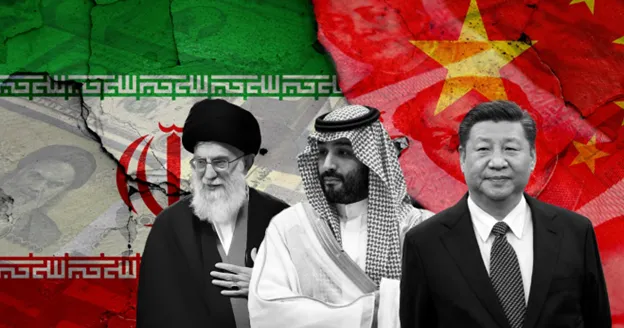Ebrahim Raisi, the President of Iran, invited Chinese President Xi Jinping to visit Tehran on Thursday. Raisi had earlier this week been to Beijing with a significant delegation. In addition to signing over 20 cooperation agreements, including ones on commerce, agriculture, and renewable energy, the two leaders demanded the easing of sanctions against Iran. Xi’s most recent trip to Iran was in 2016.
Iran has turned to China for assistance as a result of increased pressure from the United States, which has made attempts to sabotage Iran’s economic lifelines, including vital oil and gas exports and much more.
In response, China has seized the strategic opportunity while taking into account its greater goal of encircling the Middle East in its sphere of power.
Beijing clearly acknowledges Tehran as a geopolitical pivot, a nation whose significance derives from its vulnerable geographic location, as seen by its expansive approach to Tehran.
Also Read: Tenth round of sanctions by EU against Russia
On other hand, China has collaborated with Saudi Arabia, Iran’s main competitor, by committing to collaborate with Riyadh in a number of areas. Iran and Saudi Arabia have been identified by China as key allied forces for extending its influence in the Middle East.
These high-level trips show Beijing’s intention to allay Tehran’s concerns over thawing Chinese relations with other Gulf states as well as its goal to increase political, security, and economic cooperation with Iran. Iran is especially worried about the GCC’s growing connections with China, especially during Xi’s high-level visit to Saudi Arabia in December 2022.
President Xi Jinping visted Saudi Arabia to participate in the first China-Arab summit and the China-GCC summit in Riyadh in December 2022. It was claimed by Saudi Energy minister Prince Abdulaziz that cooperation between Beijing and Riyadh helped keep the oil markets stable, as Saudi Arabia is the top oil exporter in the world and China is the most significant energy user in the world.
The diplomatic balance of China demonstrates Beijing’s strategic importance for the Middle East. No matter how hard Riyadh and Tehran (in competition) strive to improve their relations with China, in the next years, Chinese interest in the Middle East is likely to increase, not decrease.
There is no doubt that, despite the US and China’s power competition, every major state in the Persian Gulf counts on China as its main trade partner. But as per experts, Saudi Arabia, not Iran, is China’s most important ally in the region. China’s key concerns in the area are the security of these energy resources and easing tensions as a result of the expanding commerce between Persian Gulf states and Beijing, particularly given Beijing’s energy dependency on the region.
Viewing historically, throughout the 1990s, a vital decade for the growth of Iran’s military-industrial foundation, China played a crucial role in assisting Iran with its military, nuclear, and missile projects.
Also Read: Pakistan, Netherlands hold 10th round of BPC
Iran and China forged closer ties after signing a 25-year strategic pact in 2021 that emphasized cooperation in the military, security, and economy. Iran views these agreements favourably in light of the fact that China has offered Iran a crucial economic lifeline by continuing to buy its oil before, during, and after the 2015 nuclear agreement, officially known as the Joint Comprehensive Plan of Action (JCPOA).
Another aspect to consider is that if Beijing-Tehran connections strengthen, the US will find it more difficult to influence Tehran’s stance through economic sanctions.
Concluding, China is among of the rare countries with substantial political and economic links to both opposing sides in the Middle East — the pro-American GCC member states and the anti-American Islamic Republic of Iran government.

